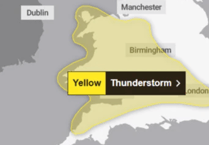More than half of private rental homes in East Hampshire were rated D or below for their energy efficiency, new figures show.
Friends of the Earth called for more financial support for those who can't afford to upgrade their homes.
All properties in Britain receive an EPC rating when they are sold or rented, from A down to G, which judges how well they preserve energy.
New data from the ONS shows only 43% of private rental properties with a rating in East Hampshire were rated C or above in the year to March.
The average rating of all eligible private rental properties in the area was 67, equivalent to band D.
Across England, 44% of private rental properties made the top three grades.
The Government confirmed landlords must uprate all properties to at least an EPC rating of C by 2030, while currently they must have an EPC rating of E or higher.
Mike Childs, head of policy at Friends of the Earth, said there was an "urgent need" for the Government to publish its Warm Homes Plan.
"This vital blueprint for upgrading the nation’s homes must ensure that no one, regardless of income or housing tenure, lives in a cold and damp home," he added.
"Cold homes cost the UK tens of billions of pounds each year in NHS costs and reduced productivity due to ill health – clearly they’re a huge own goal for public health, the economy and our climate."
He called on the Government to invest £6 billion per year for the next decade to "end the scourge of cold homes once and for all".
Of eligible properties in East Hampshire, 45% of privately-owned homes and 73% of social rented properties were rated as a band C or above.
Across all properties with a rating in the area, the average rating was 70, which is equivalent to band C.
This was higher than the average rating across the South East, which was 69, and higher than the national average, which was 68.
Peter Smith, director of policy at fuel poverty charity National Energy Action, said many households have been badly affected by the ongoing energy crisis because their homes have poor energy efficiency.
"For households on the lowest incomes, having to spend more on simply staying warm is having a huge impact," he added.
"The Government’s Warm Homes Plan must commit significant funds to energy efficiency schemes to make homes warmer, starting with the worst first."
He said renters have endured the worst energy efficiency conditions for many years, and urged the Government to raise minimum standards quickly so "tenants will stop having to live in draughty, hard to heat homes".
A Department for Energy Security and Net Zero spokesperson said: "The energy shocks of recent years have shown the urgent need to upgrade British homes. Over 1 million households are set to be lifted out of fuel poverty through the biggest potential boost to home energy standards in history.
"Our Warm Homes Plan will transform homes across the country by making them cheaper and cleaner to run, rolling out upgrades from new insulation to solar and heat pumps.
"Low-income homeowners and private tenants are also being supported to make energy performance and clean heating upgrades."




